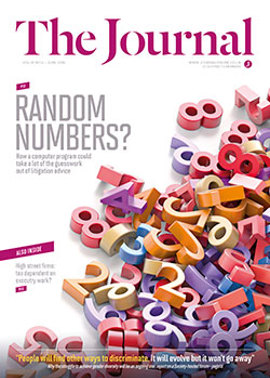Coming down the line

Digital registration services: what’s next
E-discharges
Over the last number of months, we’ve been working closely with colleagues from the Law Society of Scotland and the Council of Mortgage Lenders on the first iteration of our new electronic registration service: e-discharges.
E-discharges will be a fully digital discharge service permitting the creation, signing and submission of discharge deeds electronically. We’ve also engaged with individual solicitors and lenders to understand their requirements, ensuring that the needs of users are designed into the system right from the start.
Further detail on the activity that has been undertaken so far, moving from concept to development, can be found on our website at ros.gov.uk/about-us/ros-blog
Registration forms API
At present, access to the smart e-form (Land Register registration form) is available only by accessing the RoS online portal. Over the past few months, we’ve been creating an application programme interface (API) that will permit the initiation and partial pre-population of this form from within other services, such as case management systems.
In line with RoS principles to deliver value to our users as early as possible, we’re working on this incrementally, with the most common application type “over the whole of the registered plot” or dealings being the first candidate for the API. This is currently in test, with the next steps being the publication of a developers’ site that will share the technical documentation and provide information on how to register to use this service.
Next steps
E-discharges and the dealings API are the first steps in a programme of wider change. Over the coming months, we’ll increase our API provision to include first registrations and transfers of title and, similarly, we’ll begin the preparatory work on an electronic standard security service identifying how we can deliver efficiencies to users.
Voluntary registration: a year of progress
In our work to complete the Land Register, voluntary registration is an important route to the register in terms of land coverage. Last year, we set up two stakeholder engagement teams to promote the benefits of voluntary registration, and to help landowners and their professional representatives on the road to submitting applications to the Land Register.
Between them, these teams have travelled more than 16,000 miles to meet with private and public sector landowners and their professional representatives. They’ve engaged with more than 100 of the biggest private landowners in Scotland, and have met with more than 150 public bodies who account for about 300,000 land and property titles. They’ve also held seminars for legal and mapping professionals to explain the voluntary registration process and its benefits to them.
As a result, we’ve now registered some significant pieces of land, ranging from the Eckford Estate (part of the Buccleuch Estate) to the Inverness Town House. Many other private and public sector landowners are making good progress with their applications, although the rate of receipt of applications has been slower than anticipated.
The number of RoS staff working on voluntary registration continues to expand as we support more clients to bring forward voluntary applications. We’ll be expanding our engagement to the agricultural and commercial sectors in the coming months.
Last month, solicitors and other professionals joined the keeper and other RoS board members to discuss the progress of voluntary registration at the annual RoS board dinner. Discussions were useful, both in highlighting the opportunities voluntary registration has presented to those involved, and in identifying the remaining barriers and suggesting what could be done to make the process quicker and smoother. It’s clear that collaborative working between landowners, professionals and RoS will continue to be the key to success in voluntary registration.
In this issue
- Brexit: a brand new world
- Plans reports: an evolving scene
- Law and IT: time for a new blend
- Care proceedings, the EU and foreign nationals
- Reading for pleasure
- Opinion: Simon Di Rollo
- Book reviews
- Profile
- President's column
- Coming down the line
- People on the move
- Litigation value and risk analysis
- Views of the gender gap
- Procurement: the twin track approach
- Wills: beware bank raids
- PSLs: no poor relations
- Sanctions: the holy grail
- DNA: how conclusive?
- Restoration riddle
- Tenant farming: the first guidance
- On a sticky wicket
- Looking forward, looking back: developments in anti-doping
- Scottish Solicitors' Discipline Tribunal
- Additional support needs and age criteria
- Paralegal pointers
- Where law and politics meet
- Marsh: why the axe?
- Law reform roundup
- From the Brussels office
- New framework: watch this space
- Lost horizons?
- Payment frauds: the fight goes on
- Ask Ash
- SYLA: the year in focus
- New wind in the sails






